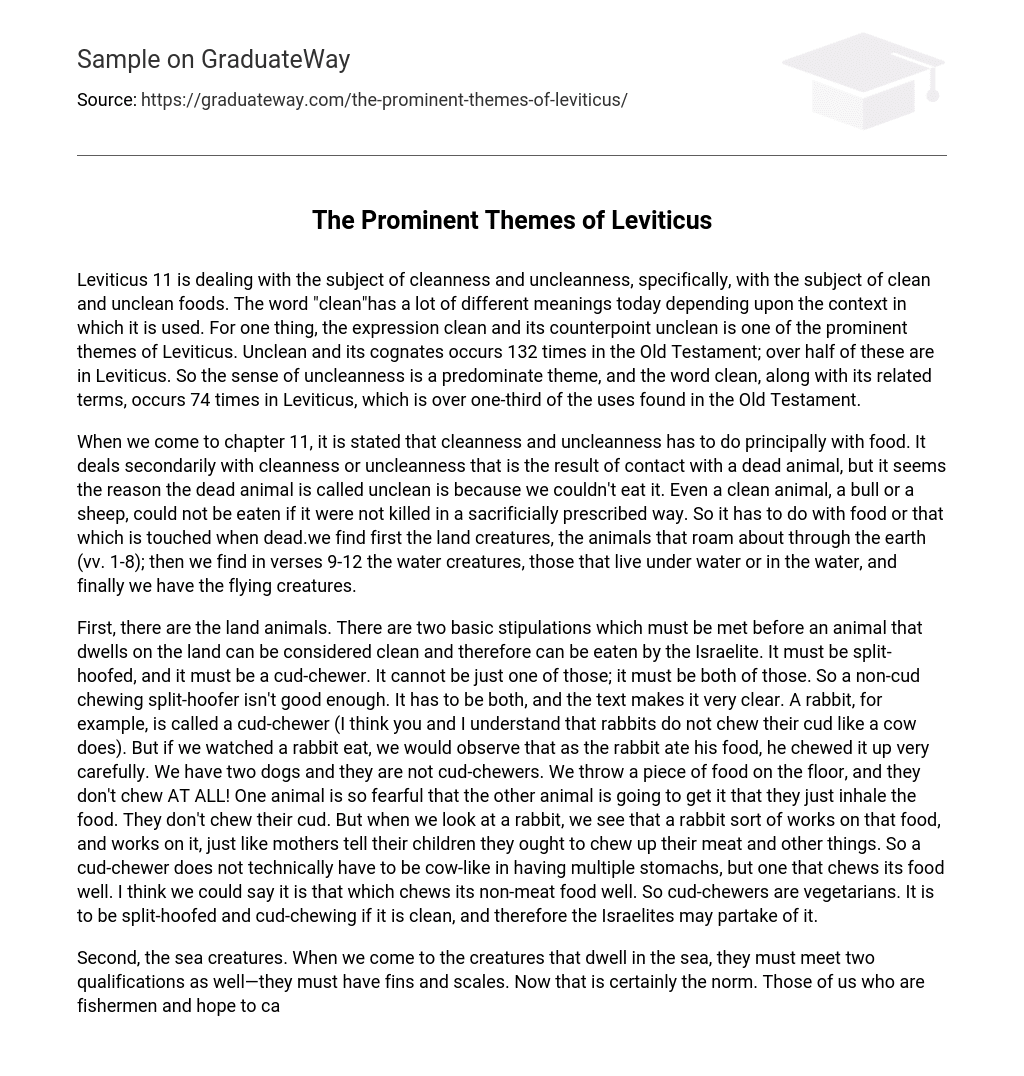The topic of cleanliness and uncleanness is discussed in Leviticus 11, particularly in relation to clean and unclean foods. The definition of “clean” can vary depending on the context. Throughout Leviticus, there is a strong emphasis on cleanliness and uncleanness, with “unclean” mentioned 132 times in the Old Testament. More than half of these instances are specifically found in Leviticus. Therefore, the concept of uncleanness plays a significant role, while the word “clean” and similar terms appear 74 times in Leviticus alone, representing over one-third of their occurrences in the Old Testament.
In Chapter 11, the topic of cleanness and uncleanness is examined, focusing on food and contact with deceased animals. This is because dead animals are not suitable for consumption. Even if an animal is considered clean, such as a bull or sheep, it can only be eaten if it has been sacrificed according to specific regulations. Therefore, the concept of cleanness and uncleanness primarily relates to food and objects that come into contact with dead animals. The chapter begins by discussing land creatures (verses 1-8), which refers to animals that roam on land. It then moves on to water creatures (verses 9-12), encompassing those that live underwater or in bodies of water. Lastly, flying creatures are addressed.
The text explains the requirements for land animals to be considered clean and permissible for consumption by the Israelites. For an animal to be clean, it must meet two conditions: it must have split hoofs and chew its cud. Both these criteria are necessary, as an animal that only meets one of these conditions is not sufficient. The example given is a rabbit, which is considered a cud-chewer despite not chewing its food like a cow does. However, if one observes a rabbit eating, they will see that it carefully chews its food. In contrast, the narrator’s dogs do not chew their food at all. A cud-chewer does not need to have multiple stomachs like a cow, but rather needs to chew its non-meat food well. Therefore, cud-chewers are vegetarian animals. To be considered clean, an animal must have both split hoofs and chew its cud, allowing the Israelites to consume it.
Secondly, when it comes to sea creatures, they must meet two qualifications: having fins and scales. Fishermen expect the creatures they catch to have both fins and scales. This means that sea creatures like shrimp, lobster, and similar ones do not qualify as they do not have fins and scales. Only fishy creatures – those with fins and scales – are considered clean.
Moreover, creatures that live in the air do not require any specific qualifications. They don’t necessarily need to have two wings to be classified as airborne creatures; however, scavengers such as vultures are excluded from this category. These creatures do not depend on dead animals for food and they don’t seem to be carnivorous. The passage also talks about flying insects and categorizes them as unclean, except for those with specialized legs for jumping. These specific jumping, flying insects are considered edible, while other types of flying insects are not.
Fourth, there is a category of unclean animals which are dead. In essence, any animal that has not been killed through the sacrificial process in front of the door of the tent of meeting is considered unclean. These unclean animals will defile through their death.
Animals that die have the ability to defile humans, unless they are sacrificed. These deceased animals can contaminate individuals. Therefore, if someone consumes the meat of a cow recently killed by a wolf, even though it could be eaten as a sacrifice to God, they would still become ceremonially unclean.
Swarming animals, including mice, lizards, and other creatures that I can easily overlook and identify without difficulty, are perplexing. The term “swarming” is associated with mice because of their tendency to move in groups with an erratic and unpredictable pattern.
The reason behind God calling the pig unclean and the cow clean remains a mystery as it is not explained by God. Research has also failed to provide a definitive answer. It is possible that there may be no reason other than the fact that God designated them as “clean” or “unclean.” God does not provide any explanations to Israel regarding the cleanliness or uncleanliness of certain things. He does not give any rationale for these definitions. Throughout history, individuals have attempted to offer explanations for these definitions of cleanliness and uncleanliness.





